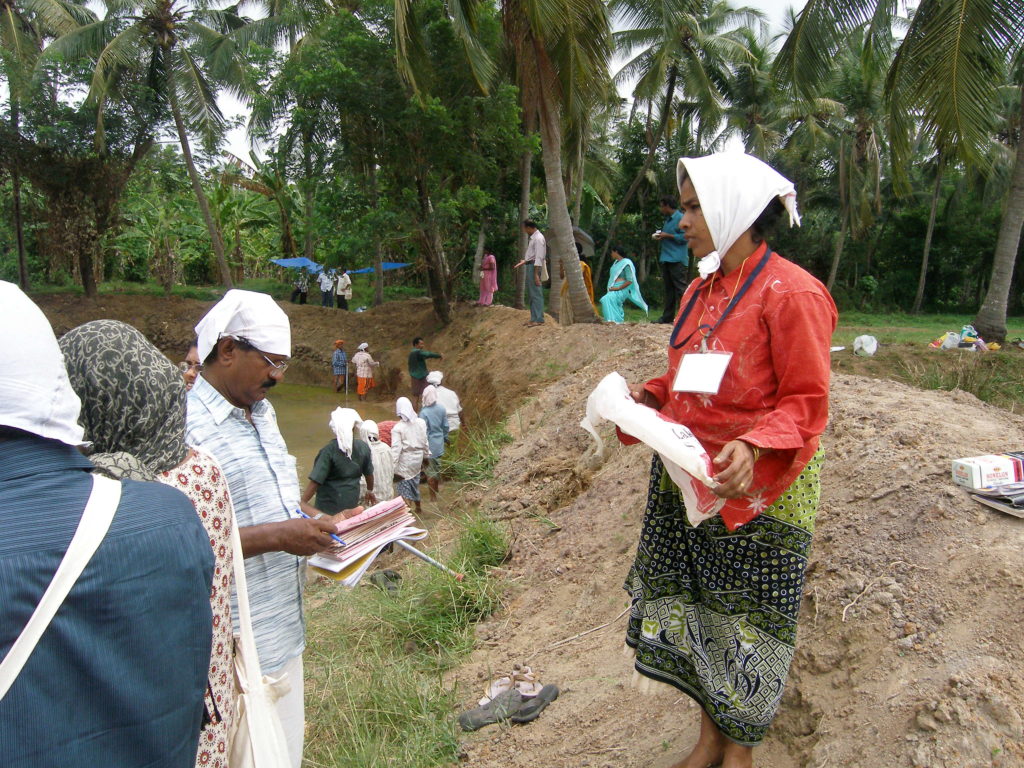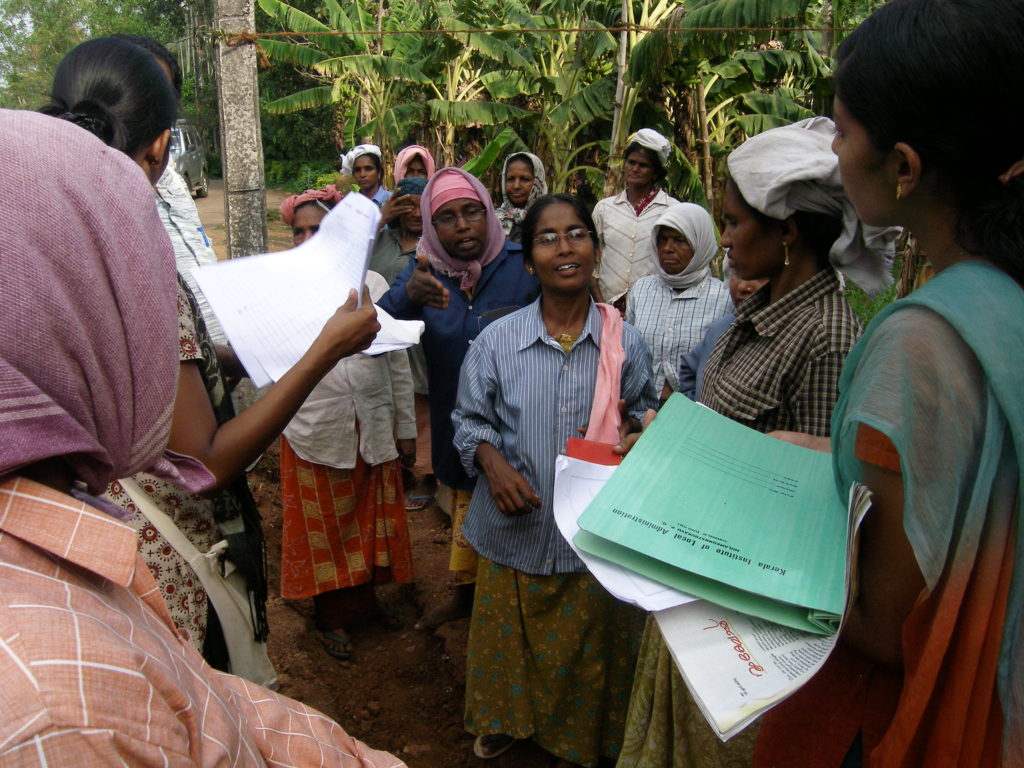Social Audits in India: Institutionalizing Citizen Oversight
This post discusses an important accountability strategy, social audits, tracing their emergence in movement-led jan sunwais or public hearings to their current institutionalized role in India’s founding national employment legislation. This post reflects on the ongoing struggle to make social audits work for India’s working poor, briefly discusses governmental initiatives to scale up accountability strategies inspired by civil society, and concludes with some reflections on the implications of the Indian social audit experience as a long-term accountability strategy.
The ongoing struggle to make government work for India’s poor
In India, social audits are public meetings in which individuals and groups critically assess the implementation of government programs, policies and law as well as actions of private entities. These social audits are an important element of grassroots advocacy to identify the gaps between the actual and desired impact of important social and economic rights such as the right to food, health, pensions and employment as well to expose violent crimes. While technocrats use the term to mean a watered-down form of government regulation, social movements have restored the term to its original Latin meaning ‘audire,’ meaning to hear. Social audits are a forum that force governments to hear the people.
“Social audits force governments to hear the people”
In India, social audits originated in the 1990s through a grassroots struggle in the rural western state of Rajasthan, where workers and peasants from the Mazdoor Kisan Shakti Sangathan (MKSS) fought to enforce minimum wages in public works programs which they knew local elites were embezzling from. This grassroots struggle to enforce minimum wages would go on to spearhead the national campaign for India’s Right to Information Act. However, more than just access to information, the workers and peasants also realized they needed public forums to interrogate what was in government documents and to what extent they mirrored reality.
The jan sunwai or public hearing (a public forum) that emerged in response to this demand was a space in which citizens could openly and collectively interrogate government agencies. Sunwai or hearing is typically associated with feudal, colonial, and state power, where subjects/citizens go with pleas or requests to powerholders to be heard. The difference between the jan sunwai and sunwai is the use of the word ‘jan’ or public. By prefixing public before hearing, MKSS turned the concept on its head. Instead of deriving legitimacy from powerholders, the jan sunwai is a hearing convened by the people. The open and public interaction between other villagers and upper caste elites, sarpanches, and gram sewaks (local elected elites, and officials) at a Jan sunwai profoundly alters the legitimacy and relevance of other public spheres such as gram sabhas (local government meetings) and jati (caste) panchayats. The villagers who collaborate with MKSS to organize jan sunwais or attend them are able to, momentarily suspend other forms and institutions of social, moral, and political control, and alter the terms of exchange between villagers and representatives of the local state. An important feature of the jan sunwai is the method of collective interrogation of state action by local villagers in an environment free from coercion. Activists work together with ordinary citizens, who depend on state welfare programs, to access and translate government information for wider dissemination. They verify the functions of worksites, health centers, and food shops and document user testimonies.
“The jan sunwai involves collective interrogation of state action in an environment free from coercion”
The information is then collated and presented at a day long public hearing, attended by journalists, retired civil servants or judges, and public officials and elected representatives. Activists/arbiters read aloud government information contained in official records and participants testify to their accuracy. Activists’ preliminary, preparatory auditing and mobilizing helps to embed auditors in the villages and enables the public forum process.
Winning official recognition
In 2005, a decade after MKSS first organized them, social audits and jan sunwais became recognized in legislation for India’s National Rural Employment Guarantee (NREGA) program. Even with a legislative mandate from the federal government, however, most state governments did not organize NREGA social audits. Until 2016, official NREGA social audits were largely ineffective, with a few exceptions. We can classify these experiences with official state government promotion of social audits into three implementation scenarios: a bottom-up civil society led process (Rajasthan), a state-led process (in undivided Andhra Pradesh), and collaboration between civil society and state (Sikkim, Bihar, and Jharkhand).
Public hearings were so powerful that they became the target of counter-mobilization campaigns
In the first scenario, in Rajasthan, where official uptake of social audits built on a movement-led legacy, the process enabled a deeper form of citizen participation that went beyond preventing corruption. As a result, these public hearings were so powerful that they became the target of counter-mobilization campaigns by government and local elected officials. In 2009, within six-months of their inception, state-supported social audits in Rajasthan came to an abrupt halt; panchayat (local government) officials interpreted social audits as a loss of sovereignty, and effectively resisted them. While this put activists on a back foot temporarily, they continued to organize social audits as well as to unionize NREGA workers, to offset the power of local panchayat officials.

Auditors inspect an NREGA worksite in Kerala. Photo: Suchi Pande
Opening up the state
So, is activism on the terrain of civil society the best or only way to “open up” the state, or is the state capable of opening itself up to broad public scrutiny? The second scenario of government-led social audits has been in the state of Andhra Pradesh, albeit inspired by the MKSS experience. Andhra Pradesh has been the only state to have consistently organized regular social audits on NREGA since 2007. Telangana (a state created after its bifurcation from Andhra Pradesh) has also completed eight rounds, auditing over 21,827 panchayats. These two states have successfully scaled up what originated as a civil society experiment by continuing to organize social audits despite changes in government and state bifurcation, proactively improving the performance of NREGA by addressing individual grievances.
Telangana and Andhra Pradesh have successfully scaled up this civil society experiment
Pro-accountability actors within the state social audit unit of Telangana have been able to exercise discretion to redress certain types of worker grievances. However, organized civil society such as movements, non-government organizations, and workers unions are largely absent from these state-supported social audits. And, a major obstacle, according to frontline social auditors, is the state government uneven response to social audit findings.
Nevertheless, Andhra Pradesh and Telangana have inspired other state governments. In 2010 the district administration in Bihar and a grassroots campaign jointly organized a social audit, and in Jharkhand, a state with high levels of poverty and an indigenous population, social audits are successfully monitoring the implementation of important food security and maternal and child nutrition programs amidst the pandemic. In 2017, the state government of the northeastern state of Meghalaya passed its Community Participation and Public Services Social Audit law, extending social audits to 21 social welfare schemes across 11 departments.
Uneven progress provokes nationwide rollout
The uneven progress on NREGA social audits across India provoked the national Comptroller and Auditor General of India (CAG) to take stock of the situation. In 2015, the CAG’s compliance audits in fifty local village governments across India revealed that state governments were violating provisions of NREGA, and diluting the spirit of social audits. The CAG’s interest in social audits compelled the national Ministry of Rural Development to form a task force to develop national standards and a consistent audit methodology. Based on the task force recommendations, the ministry adopted a social audit action plan, and instructed state governments to begin monthly social audits on NREGA. This CAG-led process, bolstered by the Indian Supreme Court, is now being rolled out across India. The scope of social audits has also expanded beyond NREGA and covers sectors such as food security, persons with disabilities, the building and construction workers act, and the juvenile justice act among others. However, state initiatives to scale up what began as civil society initiatives can have strengths and weaknesses.

Auditors recording workers testimonies in Kerala. Photo: Suchi Pande
The national rollout is only three years old, with social audits in 2020 mired by the pandemic. Overall, the CAG’s recognition has, at best, legitimized social audits in the eyes of state governments; it cannot guarantee that state government will then organize social audits. So, the implications of state support for social audit needs to be seen in relation to how different state governments will fare. There is a great deal more to do to build state capacity through training state resource persons on social audit methodology, and in strengthening state-civil society collaboration to make state-supported social audits participatory and inclusive.
We must remember the ability of the state to reform itself depends on political support, which does not exist evenly across the country and changes over time. What happens after the supportive ruling party leaves power, and the opposition has no interests in upholding the efforts of its predecessors? Further, despite their best intentions, state governments and CAG are less likely to galvanize citizens to seek accountability of state governments. The role of civil society in monitoring the implementation of welfare programs in each state will also shape the path each state will take.
What happens after the supportive ruling party leaves power?
Civil society and state actors have made varying degrees of progress in planning and carrying out social audits in sectors beyond NREGA. A recent national workshop on social audits showcased different experiences from across the country. As movements continue to organize jan sunwais and participate in state-supported social audits, the creative experiments of civil society are likely to remain significant for informing state-led efforts at increasing transparency and accountability for the foreseeable future. We need detailed comparative research across Indian states to examine the permutations for each type of initiative.
Social audits around the world
What does the Indian experience of social audits suggest for the rest of the world? Social audits are an increasingly popular evaluation tool to verify performance claims of government institutions. For example, social audits have also been used by nonprofit organizations to monitor public programs for the underprivileged in South Africa, and for fighting corruption in Guatemala, Peru, and Ghana.
The principles underpinning the Indian experience with jan sunwais and later social audits described here are different from how they are increasingly viewed in international development. While broad global interest in social audits is a good thing, the process is at risk of being confined to a technocratic enclave focused on problem solving. Social audits may reveal the problems– lack of toilets or medicines, absentee teachers or and doctors – without identifying the reasons for those problems. Social audits may pick up on symptoms, but in order to identify causes other oversight strategies become necessary.
Social audits may pick up on symptoms, but in order to identify causes, other oversight strategies are necessary
In India, social audits are viewed as an ongoing process and part of a long-term strategy of social change, rather than a one-time, stand-alone solution. More importantly, the social audit process is a potential site for organizing at the grassroots to build political capacities of citizens who depend on welfare programs as well as a training ground for activists and campaigners. In this sense, it can be both a vehicle for mobilizing support or cadre building amongst workers, agricultural laborers, community health workers and amongst wider publics who could be potential allies and help shift public priorities.
Social audits can also be a site for agitating or building countervailing citizen power outside the state to hold it accountable. The Indian experience suggests that organizing one or more social audits will not ensure schools run well, medicines are available, or wages are paid in full. For this, campaigns and civil society groups will have to incorporate social audit into their repertoire of advocacy strategies, and use other strategies in conjunction with social audits to draw attention to the problem, but also to build legitimacy for their demands both inside the state and amongst wider publics.
For more on social audits, see Citizen Oversight and India’s Right to Work Program: What Do the Social Auditors Say?


